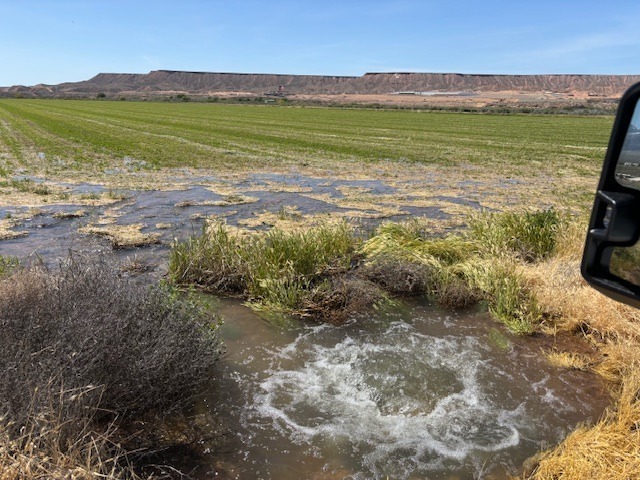- Written by: Virgin River Coalition
- April 30, 2024
In the heart of the American Southwest, where the sun beats down relentlessly and the land thirsts for water, lies a lifeline for farmers: the Lower Virgin River. This river, winding through arid landscapes, holds immeasurable importance for the agricultural community, particularly in the cultivation of alfalfa. However, amidst its significance, the river presents a unique set of challenges that farmers must navigate to harness its potential fully.
The Lifeblood of Alfalfa Cultivation:
Alfalfa, often hailed as the “queen of forages,” serves as a cornerstone in livestock feed, boasting high protein content and nutrient density. Its cultivation requires a consistent and abundant water supply, making the Lower Virgin River an indispensable resource for farmers in the region. With its waters, farmers sustain their alfalfa fields, ensuring the nourishment of livestock and the livelihoods of countless individuals dependent on the agricultural sector.
Challenges Along the River’s Course:
Yet, amidst the promise of abundance, farmers face formidable challenges stemming from the very river they rely on:
1. Sedimentation and Flooding: The Lower Virgin River, prone to seasonal flooding, carries substantial sediment loads downstream. While these sediments replenish soil fertility in some instances, excessive sedimentation poses a threat to irrigation infrastructure. Sediment buildup in irrigation channels reduces efficiency and necessitates costly maintenance, placing additional strain on farmers already grappling with environmental uncertainties.
2. Evaporation in Summer Heat: In the scorching summers of the Southwest, water evaporates at an alarming rate, exacerbating the challenge of water scarcity. High temperatures accelerate evaporation, diminishing the volume of water available for irrigation. Farmers must carefully manage water resources, implementing conservation measures to mitigate losses and sustain their crops through the blistering heat.
3. Impacts on Native Fish: The diversion of water from the Lower Virgin River for irrigation purposes disrupts the river’s natural flow, posing risks to native fish populations. As water is diverted into irrigation ditches, native fish species become entrained, jeopardizing their habitats and ecological balance. Balancing the needs of agriculture with the preservation of aquatic ecosystems presents a complex dilemma for farmers and conservationists alike.
Navigating Toward Sustainable Solutions:
In the face of these challenges, farmers along the Lower Virgin River are pioneering innovative solutions to ensure the longevity and resilience of their agricultural practices:
1. Sediment Management: Adopting strategies such as sediment traps and erosion control measures, farmers work to mitigate the adverse effects of sedimentation on irrigation infrastructure. By proactively managing sedimentation, they safeguard the efficiency of irrigation systems and promote the sustainability of agricultural operations.
2. Water Conservation Techniques: Embracing precision irrigation techniques and drought-tolerant crop varieties, farmers strive to minimize water usage and maximize efficiency. Through the adoption of advanced technologies and best practices, they optimize water utilization, reducing the impacts of evaporation and enhancing overall water stewardship.
3. Collaboration for Conservation: Recognizing the interconnectedness of agricultural and environmental interests, farmers collaborate with conservation organizations and regulatory agencies to implement holistic management approaches. By fostering dialogue and cooperation, they seek to balance the needs of agriculture with the preservation of natural ecosystems, safeguarding the Lower Virgin River for future generations.
Conclusion:
The Lower Virgin River stands as a testament to the resilience of nature and the ingenuity of those who depend on its waters. As farmers navigate the challenges posed by sedimentation, evaporation, and ecological impacts, they exemplify the spirit of adaptation and stewardship essential for sustainable agriculture. By embracing innovation, conservation, and collaboration, they not only sustain their livelihoods but also uphold the delicate balance between human needs and environmental integrity along the banks of the Lower Virgin River.
